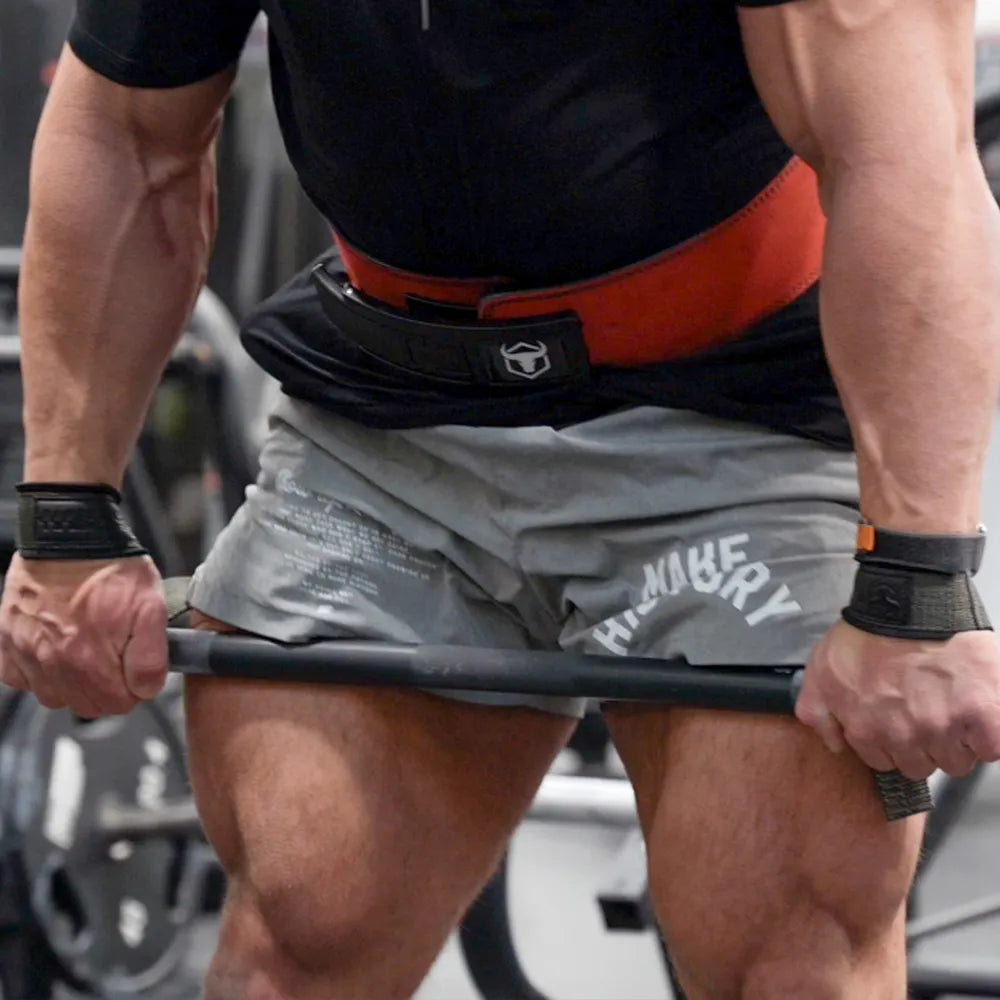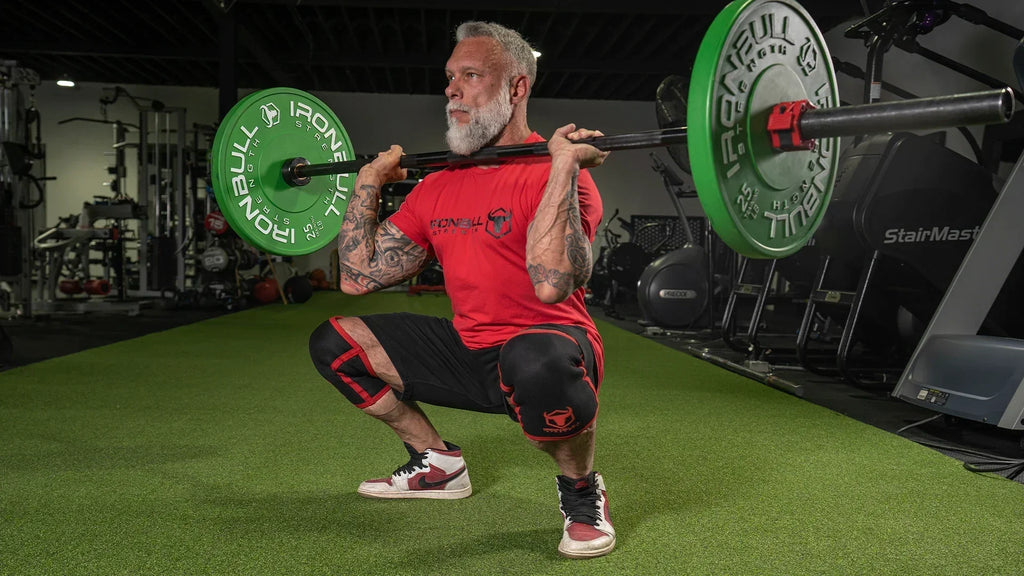Why You Should Wear Knee Sleeves for Squats

Squatting is a foundational movement in strength training, powerlifting, and general fitness. Whether you’re pushing for a new personal record or working through high-rep hypertrophy sets, your knees take on a significant amount of stress. That’s where knee sleeves come into play.
Many lifters swear by them for improved performance and joint protection, while others argue they aren’t necessary. So, what’s the truth? Let’s break down why they matter, how they work, and whether they should be a part of your squat routine.

What Are Knee Sleeves?
Knee sleeves are compression-based supports made from neoprene or other elastic materials that slide over your knees to provide warmth, stability, and slight joint compression. Unlike knee wraps, which offer rigid support for maximal lifts, sleeves offer a balance of flexibility and reinforcement, making them ideal for regular squat training.
They come in different thicknesses (usually 5mm or 7mm) to cater to different types of lifters. 5mm knee sleeves are commonly used for functional fitness and high-rep training, while 7mm knee sleeves are preferred by powerlifters and weightlifters for added support during heavy lifts.
The Benefits of Wearing Knee Sleeves for Squats
Increased Joint Stability
When squatting, your knees undergo immense pressure, especially under heavy loads. Knee supports help by compressing the joint and offering additional support, reducing the risk of instability and misalignment.
This is particularly useful if you’ve ever experienced knee discomfort or tend to feel unsteady at the bottom of your squat. A well-fitted pair of sleeves keeps everything aligned, allowing you to maintain proper form and technique throughout your lifts.
Enhanced Blood Flow and Warmth
Neoprene compression sleeves for the knees help keep your knees warm by increasing circulation around the joint. This improved blood flow reduces stiffness and discomfort, especially during colder workouts.
Better circulation means your knees stay lubricated, reducing wear and tear over time. For lifters dealing with minor knee pain, sleeves can serve as a way to mitigate discomfort without completely altering their squat routine.
Reduced Risk of Injury
While they won’t prevent all injuries, they do offer a layer of protection against common squat-related issues such as tendon strain and excessive joint stress.
By keeping the knee joint compressed and stable, sleeves help prevent unnecessary movement that could lead to ligament or cartilage damage. If you have a history of knee injuries or want to safeguard your joints, sleeves are a smart addition to your training gear.
Potential Strength and Performance Gains
Many lifters find that sleeves provide a small performance boost, particularly in maintaining tension at the bottom of the squat. The compression from the sleeves acts like a spring, giving a slight rebound effect when transitioning from the hole to the ascent.
While knee supports won’t add pounds to your squat the way knee wraps might, they do provide an edge by improving proprioception—the body's ability to sense its position and movement—which can lead to more controlled and confident lifts.
When Should You Wear Knee Sleeves?
Knee supports aren’t mandatory for every squat session, but they can be highly beneficial in specific scenarios.
-
Heavy lifting days: If you're squatting near your one-rep max (1RM) or working in lower rep ranges, sleeves offer additional joint support and stability.
-
High-volume training: For lifters who perform a lot of repetitions, knee supports help reduce fatigue and keep the joints feeling fresh.
-
Cold environments: Training in a cold gym? Then these help maintain warmth, preventing stiffness and discomfort.
-
Previous knee injuries: If you've experienced knee pain or past injuries, sleeves can provide relief and extra support.
However, if you’re focusing on mobility work, warm-ups, or lighter weight training, you might not need to use them for every session.
How to Choose the Right Knee Sleeves for Squats
Not all knee supports are created equal. To get the most out of them, you’ll need to choose the right pair based on your goals and training style.
Thickness:
-
5mm sleeves – Best for general training, CrossFit, and high-rep squat sessions.
-
7mm sleeves – Ideal for heavy squats, powerlifting, and Olympic lifting.
Fit:
- A snug fit is essential for compression and support but shouldn’t cut off circulation.
- If you prefer maximum support, opt for a tighter fit, whereas a more relaxed fit offers comfort for endurance training.
Looking for good quality knee sleeves? Check out Iron Bull Strength’s knee sleeves designed for powerlifters, weightlifters, and strength athletes.
How to Use Knee Sleeves for Squats
Wearing knee sleeves is simple, but using them correctly ensures you get the best results.
-
Slide them on before warming up – They should fit snugly, so putting them on while your legs are warm makes it easier.
-
Position them correctly – The sleeve should cover the knee cap and extend slightly above and below it to provide full compression.
-
Adjust if needed – If they slide down or bunch up, reposition them to avoid discomfort during squats.
-
Take them off post-workout – Leaving them on too long can cause excess sweating and discomfort.
Are Knee Sleeves Worth It?
For most lifters, sleeves are a worthwhile investment, especially if squats are a staple in your program. They provide joint support, reduce fatigue, and enhance performance, all without restricting movement like knee wraps.
But they're not entirely a substitute for proper squat mechanics, mobility work, or strength development. If you’re dealing with chronic knee pain, consult a professional before relying on them solely for support.
Wrapping it Up
If squats are a major part of your training routine, knee sleeves can be a game-changer. From added joint stability and improved circulation to a potential boost in performance, they offer a range of benefits without any real downsides.
While not essential for every lifter, they’re an excellent tool for serious squatters, competitive lifters, and those who want to keep their knees healthy long-term.










